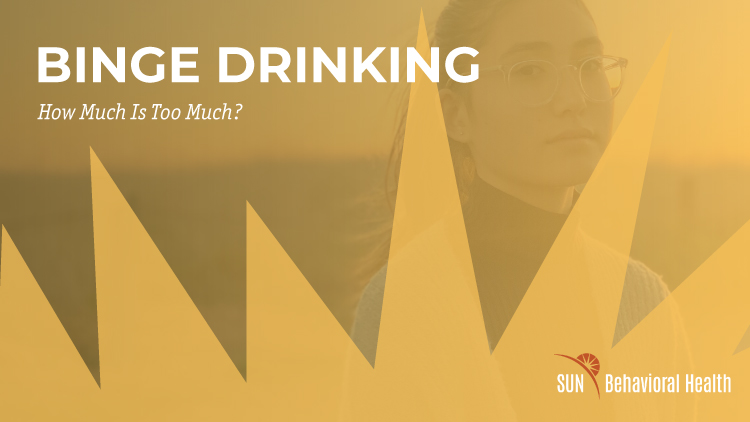Services
- Home
- Mental Health Services
- Who We Treat
- How We Treat
- Patients & Visitors
- About
close

The music from the speakers at the club pounds so loud that you feel it in your entire body. Then again, part of that could be all of the alcohol you drank. You don’t remember how many drinks you had, but you still hold one in your hand. Despite feeling dizzy and unsteady, you gulp the rest of it down. It’s okay because it’s fun, and it’s only one night a week, right? You might as well drink as much as you want.
Does that logic sound familiar to you? It’s familiar to a lot of people in Texas. 19% of Harris County adults reported binge drinking at least once in the past month in a 2021 survey. Binge drinking is a part of life for some people, especially young adults. Does other people doing it make it okay? Is binge drinking dangerous? Should you be concerned if someone you know is binge drinking? Read on for answers to all of those questions and more.
When people think of binge drinking, they think of people drinking a lot. That much is true. When asked about how much is too much, or what qualifies as binge drinking, though, most people don’t know the answer.
There isn’t a hardline definition to classify binge drinking. It’s a little different depending on where you look, but the most agreed-upon answer is five or more drinks at one time for men, and four or more drinks at one time for women.
The most obvious way to know if someone has been binge drinking is to ask them the amount of drinks they’ve had. Going by the previous definition, you can determine whether they’re binge drinking based on their answer. If the person doesn’t know how many drinks they had, you can’t know for sure that they’re binge drinking, but that level of intoxication is a warning sign in itself. Someone being intoxicated doesn’t necessarily mean they’ve been binge drinking. Still, if they exhibit any of the following symptoms, there’s a good chance they recently binge drank:
It’s important to note that if a person consuming alcohol is vomiting, losing consciousness, having trouble breathing, having extreme difficulty speaking, hallucinating, and/or having seizures, they may have alcohol poisoning. In that case, the person must stop drinking. Don’t leave them alone, and seek medical attention for them immediately.
One in every six US adults binge drinks, and 25% do it weekly or more frequently. Because drinking alcohol is legal, binge drinking is accepted as a normal part of some people’s lives. This is especially true for college students who are practically expected to binge drink at least once during their college experience. That doesn’t mean binge drinking is safe.

Even though binge drinking is socially acceptable in some circles, it can have terrible consequences. Many drunk driving accidents are due to binge drinking, which can cause death. Binge drinking also increases the risk of injury of the person drinking due to the lack of coordination and balance brought about by heavy intoxication. People who binge drink are more likely to make dangerous decisions, such as engaging in unprotected sex. Binge drinking can also cause alcohol poisoning.
Long-term binge drinking can impact a person’s health in other ways, sometimes causing:
While these are major concerns, it’s important to keep the social consequences of binge drinking in mind as well. Binge drinking can isolate people from their friends and family, especially if they don’t enjoy drinking. Binge drinking, and the hangovers that follow, can worsen performance at work and school. While binge drinking is always dangerous, the danger increases for people who binge drink more frequently.
Binge drinking doesn’t mean someone has an alcohol use disorder. Many people who binge drink don’t become dependent on alcohol at all and can stop drinking whenever they’d like. The key difference between binge drinking and alcohol use disorder is binge drinking is drinking excessive alcohol in a short amount of time, while alcohol use disorder consists of repeated alcohol use over a long period of time.
Alcohol use disorder can, and often does, involve binge drinking, but it doesn’t have to. Alcohol use disorder is a health condition defined in the Diagnostic and Statistical Manual of Mental Disorders (DSM-5). Someone with an alcohol use disorder drinks despite it causing negative consequences in their life, and often craves and thinks about alcohol. Those with alcohol use disorder have trouble cutting back on drinking and often drink more than they intend to. The DSM-5 splits alcohol use disorder into mild, moderate, and severe alcohol use disorder based on how many symptoms a person exhibits.
For example, a woman who likes going out and binge drinking on weekends but stops as soon as she gets pregnant would not have an alcohol use disorder. A person who drinks a glass or two of wine after work every day and feels like they can’t go without it, often thinking about drinking even when they aren’t at home, likely has a mild alcohol use disorder.
If you have a habit of binge drinking and are looking to change that, or have friends who binge drink, here are some tips:
You’ll likely still encounter someone binge drinking even if you follow these suggestions. If someone is already intoxicated from binge drinking, the best thing to do is ensure they don’t drink more, and make sure they aren’t alone. If you can’t stay with them yourself, ask someone to look out for them. A lot of things can go wrong when someone binge drinks, and having someone keeping an eye on anyone binge drinking reduces a lot of the danger an intoxicated person may run into.

Maybe reading through this post has been a wake-up call for you. Maybe you realized you regularly binge drink, and it’s negatively impacting your life. If you feel empty without binge drinking every weekend, or you drink large amounts of alcohol often and feel like you can’t stop, you likely have an alcohol use disorder.
Realizing is an important first step. It can be difficult to overcome an alcohol use disorder on your own, and you don’t have to. The second step is seeking alcohol detox.
Do you think you have an alcohol use disorder? SUN Behavioral Houston is here to help. If you’re uncertain and don’t know whether your alcohol use classifies as an alcohol use disorder, we offer care assessments at no cost. We’ll help you determine what kind of customized treatment is best for you, and we’ll get to the root of your alcohol use. Call us today at 713-796-2273 for more on what we can do for you.
There’s nothing wrong with drinking on weekends, but anyone who binge drinks at any point runs the risk of getting alcohol poisoning. If drinking alcohol becomes a regular part of your life, even on the weekends, you also have a higher chance of developing an alcohol use disorder. The suggested safe alcohol use is two drinks in one day for men and one drink in one day for women. Your drinking habits aren’t okay once they negatively impact your life.